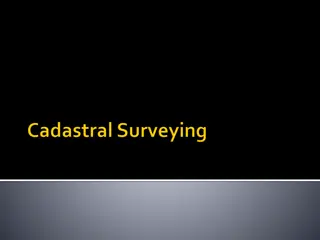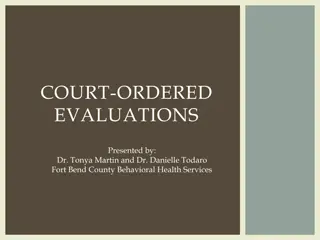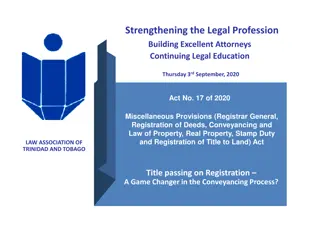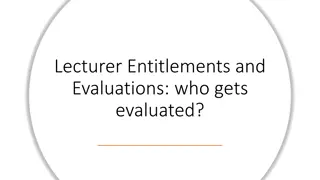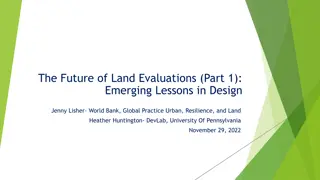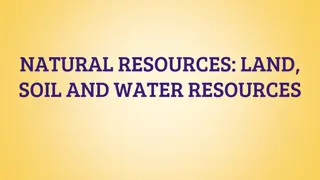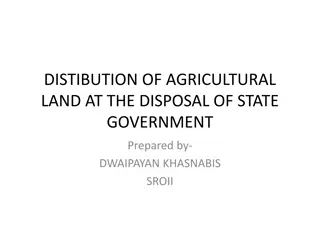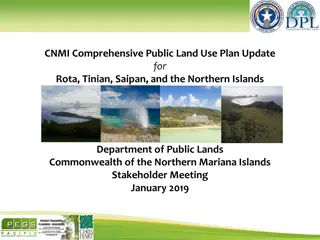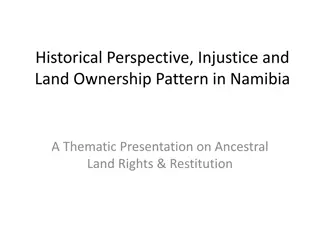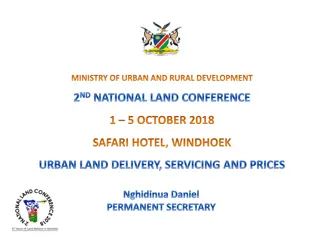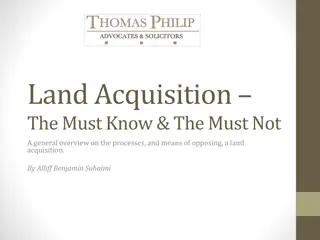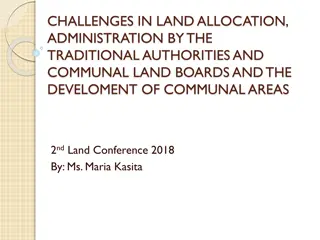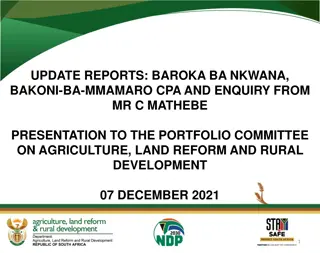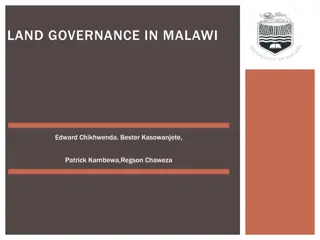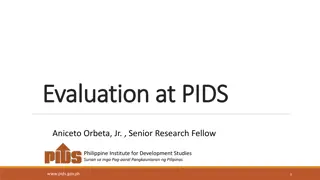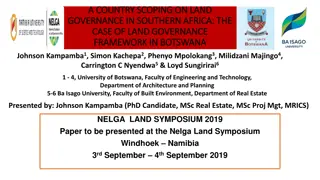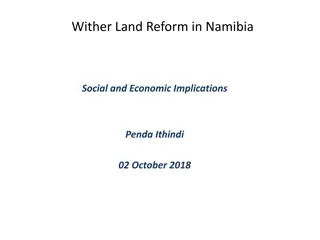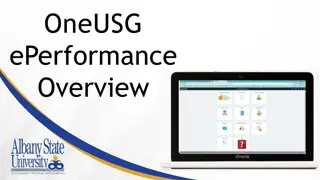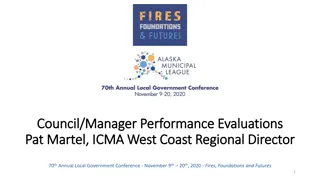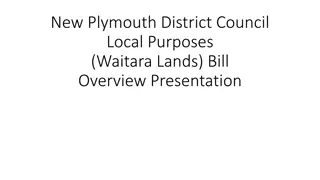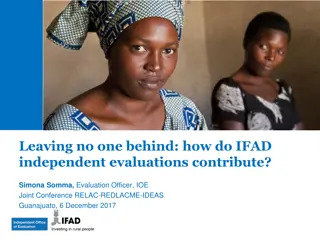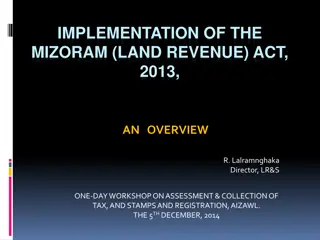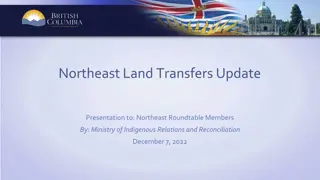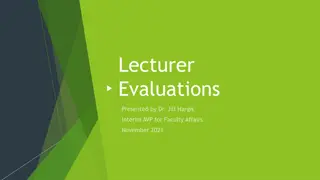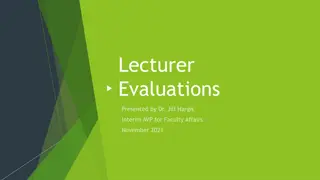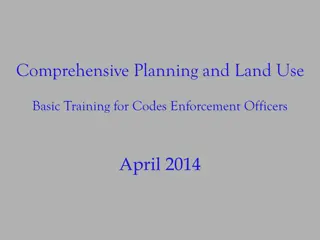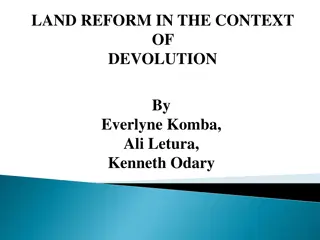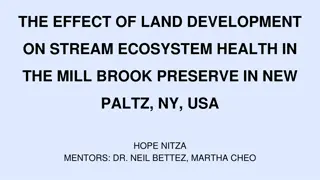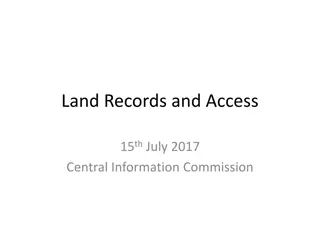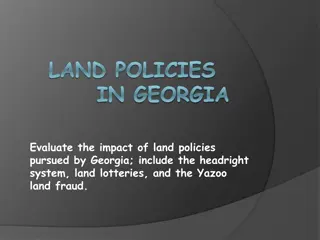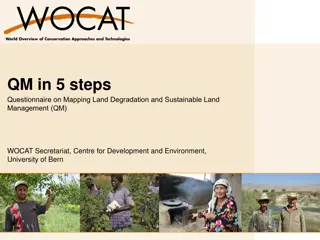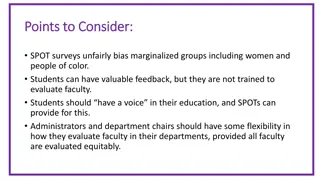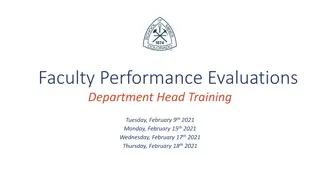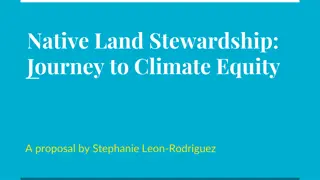Promising Practices for Faculty Evaluations in DEIA - ASCCC Spring 2023 Plenary
Explore promising practices for faculty evaluations focusing on Diversity, Equity, Inclusion, and Anti-Racism (DEIA) in the ASCCC Spring 2023 Plenary. Learn about Title 5 regulations, initiatives for systemic change, and creating a community of belonging through inclusive evaluations. Presenters inc
1 views • 15 slides
Understanding Cadastral Systems in Land Management
Cadastral systems play a crucial role in land management by handling land registration, property taxation, and land tenure. These systems involve private conveyancing, registration of deeds, cadastral surveying, and mapping to maintain records efficiently. They provide information on parcel index ma
1 views • 16 slides
Court-Ordered Psychological Evaluations and Processes
Explore court-ordered psychological evaluations presented by Dr. Tonya Martin and Dr. Danielle Todaro from Fort Bend County Behavioral Health Services. Understand the purpose, information provided, and expert requirements for such evaluations. The evaluation process involves reviewing records, clini
0 views • 68 slides
Evolution of Land Law Systems in Trinidad and Tobago
Trinidad and Tobago's land law systems consist of the Common Law System and the Registered Land System. The Common Law system governs unregistered land where title passes upon execution and delivery of the deed. In contrast, the Registered Land System confers ownership upon registration and offers c
0 views • 28 slides
Guidelines for Lecturer Evaluations and Entitlements at CPP
This document outlines the evaluation process for lecturers at CPP, including annual and cumulative evaluations, who needs to be evaluated, the importance of cumulative evaluations, and the time periods covered by evaluations. It explains the criteria for evaluations, ensuring fair assessment and pr
1 views • 10 slides
Insights on Land Evaluations: Lessons and Challenges in Design
Exploring emerging lessons and gaps in land evaluations, this content delves into the impacts of land tenure interventions on agriculture, economic outcomes, and environmental sustainability. The discussion highlights key findings, such as the positive effects of formalization on agricultural land b
2 views • 13 slides
Understanding Land, Soil, and Water Resources
Natural resources such as land, soil, and water are crucial for human activities. Land comprises the lithosphere and is utilized for various purposes based on land use patterns. The study of land use patterns is essential for economic planning, as the availability of land is limited, leading to conf
5 views • 25 slides
Principles of Agricultural Land Distribution by State Government
The article discusses the distribution of agricultural land at the disposal of the state government in line with the policy objectives outlined in the WBLR Act. It covers the types of agricultural lands available, principles of land distribution, and restrictions on land transfers. Priority is given
0 views • 14 slides
CNMI Public Land Use Plan Update Stakeholder Meeting 2019
The CNMI Comprehensive Public Land Use Plan Update details the key drivers for land selection, recommendations for future land uses on each island, and includes discussions on the project team, schedule of key milestone dates, and the purpose and scope of the plan outreach and participation. The sta
4 views • 29 slides
Namibia's Ancestral Land Rights: Historical Injustice and Restitution
Explore the historical context of land ownership in Namibia, focusing on ancestral land rights, colonization processes, and the impact on indigenous populations. Learn about the notion of ancestral land, who should be considered indigenous, and the colonial modes of land acquisition. Uncover the str
0 views • 33 slides
Challenges and Solutions in Urban Land Delivery and Pricing in Namibia
The Urban Land and Housing Sector in Namibia faces significant challenges such as a backlog in land delivery, high input costs, weak urban planning, and limited institutional capacity. These issues lead to slow supply rates and affordability problems for end users. Addressing these challenges requir
0 views • 20 slides
Understanding Land Acquisition Processes and Means of Opposing
Federal laws in Malaysia allow for land acquisition for public purposes or economic development. The process involves notification to the public, entry and survey marking of land, and award by the Land Administrator. Only persons defined as "interested" under the Land Acquisition Act can raise objec
3 views • 40 slides
Challenges in Land Allocation and Administration by Traditional Authorities and Communal Land Boards
The Communal Land Reform Act of 2002 introduced Communal Land Boards to assist Traditional Authorities in land administration. However, challenges such as misconceptions of powers, limited technical capacity, inadequate resources, and unclear procedures have hindered smooth registration and resoluti
0 views • 15 slides
Update Reports: Baroka Ba Nkwana, Bakoni-Ba-Mmamaro CPA, and Enquiry from Mr. C. Mathebe Presentation to the Portfolio Committee on Agriculture, Land Reform, and Rural Development
This report provides updates to the Portfolio Committee on Agriculture, Land Reform, and Rural Development regarding Mr. Collen Mathebe's matter, Bakoni-Ba-Mmamaro CPA, and Baroka Ba Nkwana Land Claim. Mr. Mathebe's issue cannot be resolved through the Land Title Adjustment Act, and alternative opti
0 views • 38 slides
Land Governance in Malawi: Challenges and Progress
Malawi's land governance system has evolved significantly since the colonial era, with a framework that includes institutional and legal aspects. The country has faced challenges in managing land disputes, valuation, taxation, and public land use. The institutional setup involves the central governm
0 views • 23 slides
Evaluation Activities at PIDS: Types, Completed, Ongoing, Proposed
A comprehensive overview of evaluation activities at the Philippine Institute for Development Studies (PIDS), including completed evaluations such as TESDA scholarship programs, ongoing evaluations like Sustainable Livelihood Program, and proposed evaluations for the coming years. The content covers
0 views • 13 slides
Land Governance Framework in Botswana: A Country Scoping Study
Botswana, a landlocked middle-income country in Southern Africa, faces challenges such as high population growth, unemployment, poverty, and a less skilled workforce. This study examines the land governance framework in Botswana, focusing on key challenges in land administration, dispute resolution,
0 views • 15 slides
Implications of Land Reform in Namibia: Social and Economic Insight
Land reform in Namibia is crucial for inclusive growth and shared prosperity, with access to land being a key factor. Productive land usage can lead to wealth creation and social development. The importance of agriculture in the economy is highlighted, along with the need for skilled farmers and a s
0 views • 7 slides
Enhancing Land Degradation Neutrality Targets in Lebanon's National Action Programme
Integrating LDN targets into Lebanon's National Action Programme, led by Dr. Chadi Mohanna, aims to align the NAP with the UNCCD's 10-Year Strategy, set national targets for Land Degradation Neutrality, and implement measures to combat land degradation aggravated by climate change. The project focus
0 views • 23 slides
OneUSG.ePerformance Overview and Process Summary
OneUSG.ePerformance is a comprehensive system encompassing job openings, applications, onboarding, and performance evaluations. ePerformance involves electronic evaluations within OneUSG Connect, providing access to historical evaluation documents. The evaluation process includes self-evaluation, ma
0 views • 17 slides
Performance Evaluation Process in Local Government Conferences
Explore the intricate process of performance evaluations in local government settings as discussed during the 70th Annual Local Government Conference. The evaluation process covers key aspects such as initiating evaluations, the role of city managers and councilors, benefits of facilitated evaluatio
0 views • 12 slides
Land Management and Funds Allocation in New Plymouth District Council: Overview
This presentation provides an overview of the New Plymouth District Council Local Purposes (Waitara Lands) Bill, detailing the key provisions related to land sales, fund allocation, and the establishment of a Waitara Community Board and a Waitara Hap Land Fund. The bill outlines the distribution of
0 views • 12 slides
Enhancing Inclusivity: IFAD Independent Evaluations for Better Targeting
IFAD independent evaluations play a crucial role in ensuring that vulnerable groups are not left behind in rural development initiatives. By assessing the effectiveness of targeting methods, documenting instances where vulnerable groups are excluded, and providing recommendations for improvement, th
0 views • 8 slides
Overview of the Mizoram Land Revenue Act, 2013
The Mizoram Land Revenue Act, 2013 replaced several previous regulations and came into effect on June 1, 2013. It establishes authorities for land management, outlines control and powers over land, and provides guidelines for land allotment for specific purposes. The Act designates the Government of
0 views • 18 slides
Update on Northeast Land Transfers: Presentation to Roundtable Members
Ministry of Indigenous Relations and Reconciliation provided an update on land transfers in Northeastern British Columbia, focusing on Treaty Land Entitlement, stakeholder engagement, and communication methods. The presentation highlighted the historical land debt, final settlement agreements, and t
0 views • 8 slides
Performance Evaluation Workshop 2022 for Civil Service & Academic Positions
This workshop outlines the Performance Evaluation Cycle for the year 2022, detailing the evaluation period, form submission deadlines, and the shift towards digital evaluations. It emphasizes the importance of constructive feedback in evaluations and provides insights into the purpose of evaluations
0 views • 34 slides
Faculty Evaluations: Periods, Deadlines & Procedures
Annual and cumulative evaluations for temporary and tenured faculty are essential in the academic setting. Annual evaluations cover the past year's teaching activities while cumulative evaluations consider a longer timeframe. Deadlines and review processes are detailed in the evaluation calendar for
0 views • 12 slides
Lecturer Evaluations and Policies at Cal Poly Pomona
Annual and cumulative evaluations are conducted for lecturers at Cal Poly Pomona to review their performance over specific periods. Policy 1336 outlines the criteria for evaluations, including timelines and requirements for different categories of lecturers. The evaluations cover teaching activities
0 views • 13 slides
Understanding Comprehensive Planning and Land Use for Code Enforcement Officers
Comprehensive Planning involves guiding community growth through the creation of a Comprehensive Plan. Land Use refers to the classification and regulation of how land is utilized. Police Powers allow municipalities to regulate land use to protect public health, safety, and welfare. The regulation o
0 views • 27 slides
Land Reform in the Context of Devolution in Kenya
Kenya, with a land area of 582,646 sq. Km, has undergone land reform in the context of devolution since gaining independence in 1963. The country's adoption of the Constitution in 2010 led to the establishment of a system with 1 national government and 47 devolved governments. Kajiado County, inhabi
0 views • 33 slides
Impact of Land Development on Stream Ecosystem Health in Mill Brook Preserve, NY, USA
The study focuses on the effects of land development on stream ecosystem health in the Mill Brook Preserve in New Paltz, NY. It discusses the degradation of water quality due to surrounding land development and the importance of macroinvertebrates as indicators of ecosystem health. The review of lit
0 views • 23 slides
Importance of Land Records in Preventing Land Disputes
Land records play a crucial role in documenting ownership, facilitating land-related transactions, and preventing costly litigation. They serve as a lifeline for effective governance and provide legal status to landowners, ensuring clarity and transparency in land ownership. Without proper land reco
0 views • 15 slides
Impact of Land Policies in Georgia: Headright System, Land Lotteries, and Yazoo Land Fraud
Georgia pursued various land policies post-Revolutionary War to allocate land obtained from Native Americans. The headright system granted land to soldiers and white men, aiming to boost population and state power. Land lotteries distributed land through random draws. The Yazoo land fraud scandal ta
0 views • 20 slides
5 Steps Questionnaire on Mapping Land Degradation and Sustainable Land Management
Preparation for mapping land degradation and sustainable land management involves steps such as preparing the base map, identifying contributing specialists, assessing land use systems, understanding land degradation types, and providing expert recommendations. The process includes analyzing area tr
0 views • 32 slides
Addressing Bias in Student Evaluations of Faculty: Considerations and Resolutions
SPOT surveys can unfairly bias marginalized groups in academia, such as women and people of color, impacting faculty evaluations. While student feedback is valuable, students may not be equipped to assess teaching effectively. Institutions should use SPOT data for reflection rather than consequentia
0 views • 4 slides
Ashumet Park Common Land Project Overview
The Ashumet Park Common Land Project aims to transform Lot 8 into a multi-use community area in Ashumet Valley. The project includes three phases: Land Survey, Land Clearing, and Grass Installation. Phase 1 involved conducting a land survey, while Phase 2 focused on land clearing by removing trees a
0 views • 7 slides
Faculty Performance Evaluations Department Head Training Overview
Faculty Performance Evaluations Department Head Training provides an in-depth overview of the workflow process for department heads, covering accessing the OnBase Workflow, managing evaluation queues, retrieving final evaluations, and additional information. The training includes demos, practices, a
0 views • 12 slides
Coverage Evaluation for Preventive Chemotherapy
Methods for evaluating treatment coverage in preventive chemotherapy for neglected tropical diseases (NTDs) are crucial for achieving disease control and elimination goals. Routine data can be unreliable due to various biases and errors, highlighting the importance of population-based surveys for pr
0 views • 21 slides
Understanding Settlement Agreements in Special Education Cases
Delve into the complexities of settlement agreements in special education cases through the lens of the South Kingstown v. Joanna S. case in the First Circuit Court. The case revolves around disputes over independent educational evaluations, occupational therapy evaluations, and psychoeducational ev
0 views • 27 slides
Native Land Stewardship: Path to Climate Equity
Stephanie Leon-Rodriguez presents a proposal focused on promoting land back initiatives, including federal support programs like the Land Buy-Back Program for Tribal Nations and conservation easements. State support through initiatives like the Mass Conservation Land Tax Credit Program is also highl
0 views • 13 slides

